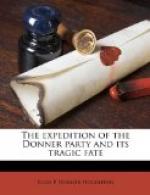[Footnote 28: Should be spelled Keseberg.]
[Footnote 29: General Kearney and escort, accompanied by Edwin Bryant.]
[Footnote 30: McGlashan’s “History of the Donner Party” (1879).]
[Footnote 31: The old Alcalde records are not in existence, but some of the survivors of the party remember the circumstance; and Mrs. Samuel Kybert, now of Clarkville, Eldorado County, was a witness at the trial. C.F. McGlashan, 1879.]
IV
LEWIS KESEBERG
In March, 1879, while collecting material for his “History of the Donner Party,” Mr. C.F. McGlashan, of Truckee, California, visited survivors at San Jose, and coming to me, said:
“Mrs. Houghton, I am sorry that I must look to you and your sisters for answers to the most delicate and trying questions relating to this history. I refer to the death of your mother at the hand of Keseberg.”
He was so surprised and shocked as I replied, “I do not believe that Keseberg was responsible for my mother’s death,” that he interrupted me, lost for a moment the manner of the impartial historian, and with the directness of a cross-questioning attorney asked:
“Is it possible that Mrs. George Donner’s daughter defends the murderer of her mother?”
And when I replied, “We have no proofs. My mother’s body was never found,” he continued earnestly,
“Why, I have enough evidence in this note book to convict that monster, and I can do it, or at least arouse such public sentiment against him that he will have to leave the State.”
Very closely he followed my answering words, “Mr. McGlashan, from little girlhood I have prayed that Lewis Keseberg some day would send for me and tell me of my mother’s last hours, and perhaps give a last message left for her children, and I firmly believe that my prayer will be granted, and I would not like you to destroy my opportunity. You have a ready pen, but it will not be used in exact justice to all the survivors, as you have promised, if you finish your work without giving Keseberg also a chance to speak for himself.”
After a moment’s reflection, he replied, “I am amazed; but your wish in this matter shall be respected.”
The following evening he wrote from San Francisco:
You will be glad to know that I
have put Harry N. Morse’s detective
agency of Oakland upon the track of Keseberg,
and if found, I mean
to take steps to obtain his confession.
In less than a week after the foregoing, came a note from him which tells its own story.
SACRAMENTO, Midnight, April 4, 1879
MRS. E.P. HOUGHTON,
DEAR MADAM:—




